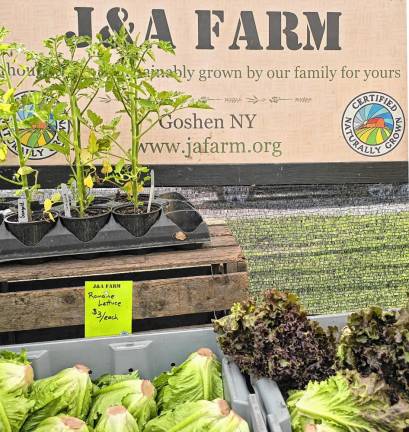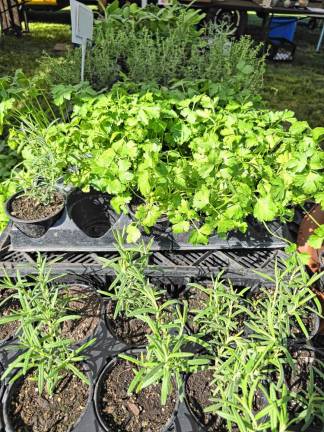Protecting the soil is key to Lakeside Farmers Markets produce


Most of the farmers and orchard managers who participate in the Lakeside Farmers Market in Greenwood Lake on Saturdays are “micro farmers” – members of an elite group of agricultural practitioners who are preventing our soils from being depleted by traditional industrial farming techniques that can rob the land of nutrients and require the regular application of pesticides and fertilizer.
These local farmers are part of a growing movement that can deliver fresh, healthy, and nutrient-rich foods to our tables faster and cheaper than what we have been accustomed to when shopping at big-box stores. Here are the facts:
Location: The Black Dirt Region, home to many of the vendors at the Lakeside Farmers Market, encompasses about 26,000 acres of some of the most nutrient-rich soil in the world. It is only found in a few regions including Poland, Ukraine, parts of Canada, and a few patches throughout the United States. This soil is rich in carbon-based earthworms, biota, decaying organic materials, and other microbes which enrich the soil and provide life for all living creatures, including the food we eat.
Timing: Most of the produce found in larger chain grocery stores in the U.S. travel an average of 1,500 miles, trying to ripen in the process, and losing much of their antioxidants. According to Jeff Bialas, who has been operating his Goshen-based certified naturally grown J&A farm with his family since 2010, “If you don’t eat lettuce within 24 hours of its harvest, you lose much of its nutrients.” Most of the fruits and vegetables present at local farmers markets like the one at Lakeside, arrive within hours of being harvested, ensuring that customers are getting the freshest, most nutrient-dense foods available.
Flavor: What distinguishes the produce and fruits at Lakeside is the flavor. Packed with their original antioxidants, vitamins and nutrients, you can tell the difference by just tasting them. By protecting the integrity of the soil, the farmers can grow extraordinary (and diverse) varieties of flavorful items like string beans, flat Italian Romano beans, purple string beans, green string beans, and yellow ones in the coming weeks. Later in the season, “I’ll have about 20 different varieties of cherry tomatoes,” Bialas predicted, “plus 15 different heirloom tomatoes, beefsteaks, San Marzano plums, and tomatillos together with a variety of herbs, including rosemary, dill, basil, oregano, cilantro, parsley and others.”
Reduction of greenhouse gases: According to the Rodale Institute, industrial agriculture’s reliance on monocropping has resulted in producing more profitable crops at the cost of depleting the soils and accelerating erosion. Instead, organic farming techniques that rely upon smaller, more decentralized farms that produce more diverse crops, has proven to: match or surpass conventional yields, emit 35% fewer greenhouse gases, and use 45% less energy. The more that soils are better managed, the more food that can be produced with it.
In the U.S., according to the producers of the upcoming film “The Need to Grow,” “We are losing soil at 10 times the rate that it can be replenished.” You may have noticed that many local farmers sow cover crops in the off season that protect the soil rather than leaving them exposed to the elements. That process, together will no-till farming, help to produce “humic substances” (proteins, carbohydrates, aliphatic biopolymers, and decomposing organic matter), one of the most important indicators of a soil’s health. The film went on to reveal that “a healthy tablespoon of soil like Black Dirt, for example, can contain an astonishing six billion of microorganisms, including tens of thousands of different species that are part of a constellation of ingredients that, together with underground fungal mycelium networks, transport water, carbon, and nutrients that stabilize the soil and prevent erosion.”
But knowing where our food comes from is the first step in becoming more aware of how our food system operates. This season the full-time vendors exhibiting each Saturday at the Lakeside Farmers Market, from 9 a.m. to 1 p.m., will include J&A Farms, Locust Grove Fruit Farm, Hillery Farms/Peg’s Eggs/Lowland Farms (who will also be providing poultry, beef, lamb, and pork), The Original Laker Baker, Hoffman Bread, The Flower and Dough, Unique Creations, NASA/master gardener Jim Hall, as well as part-time vendors Hudson Valley Pantry and Flower Cakes by Nadine. You can ask them questions and discover things about your food that you may have never known! To learn more about the Lakeside Farmers Market, visit villageofgreenwoodlake.org/lakeside-farmers-market.